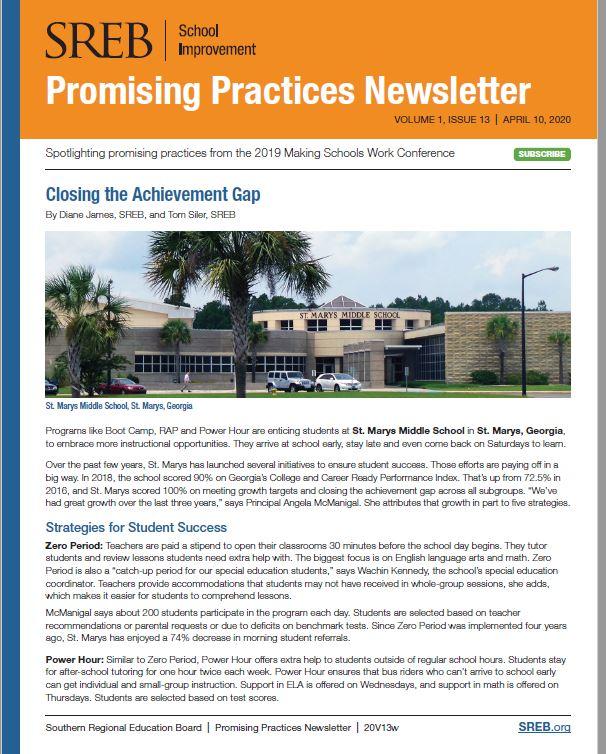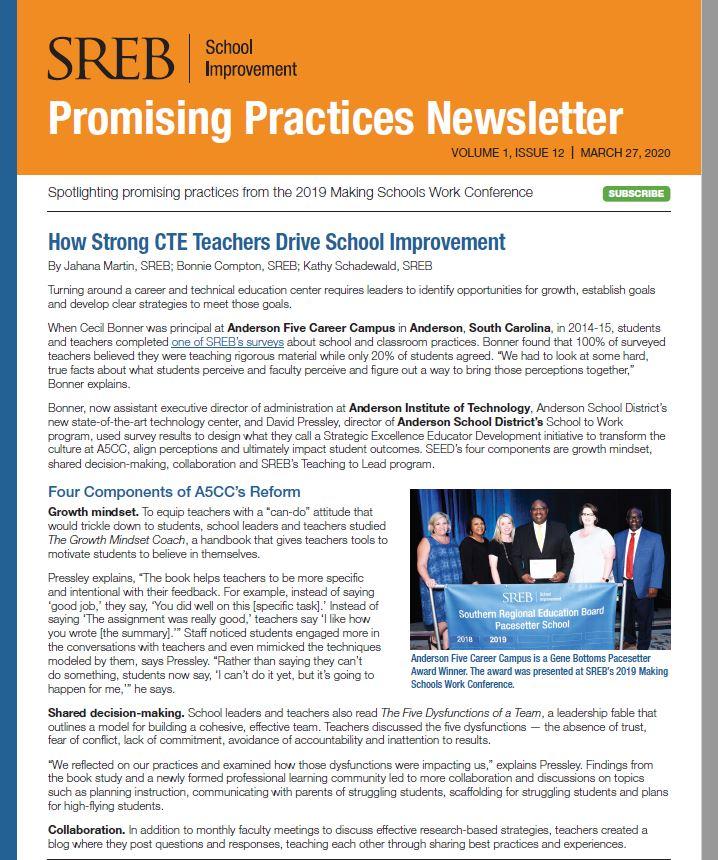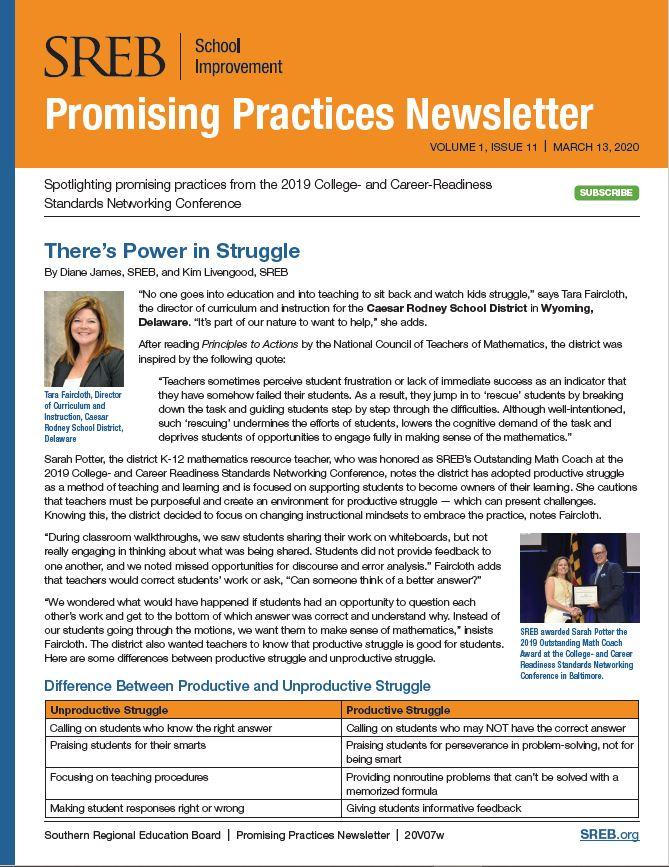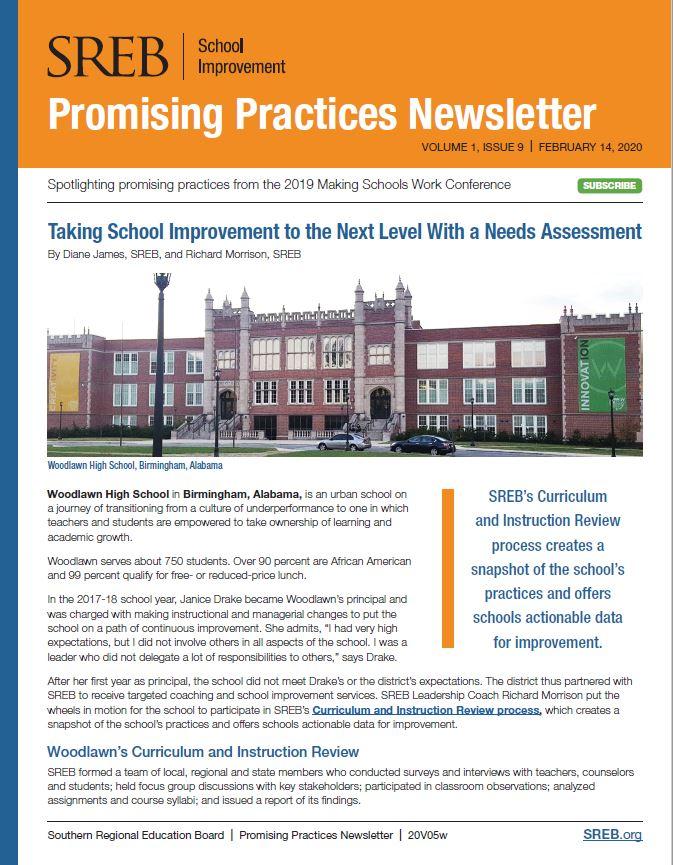Promising Practices Past Issues
Promising Practices Newsletters
Past Issues
SREB’s Promising Practices Newsletter contains real school and classroom practices from school leaders, counselors and teachers from across the U.S.
To receive email notifications when new newsletters are published, please subscribe to our newsletter.
Inside: A human number line demo, scoreboard instructions and three articles on engaging students
This edition keeps the idea that “learning is fun” front and center. To help examine the SREB focus area “engaging content,” our coaches and reporters created a video demo of a human number line you can use in your math classes, a scoreboard instruction sheet you can use in any class and three articles all about different ways to keep you class engaged with learning.
Download the full edition to get it all.
Inside: Conference Highlights and Posts on Our Keynote and Featured Speakers
In this edition, we feature the 2023 Making Schools Work Conference. You’ll get a conference highlights video, an infographic with exit survey results and three articles filled with tips from both of our keynote sessions and one of our featured speaker sessions.
Download the full edition to make sure you don’t miss anything!
INSIDE: EVERY DAY STUDENTS ARE LIT: ENGAGING ELA INSTRUCTION
In this issue, a Georgia literature teacher shares
strategies to get students pumped up about reading; a New York
educator promotes creating an anti-bullying environment to
provide a safe space for students to learn; and an Alabama
educator says understanding how the adolescent brain works helps
teachers design effective lessons. Start reading our
flipbook ordownload the complete issue (PDF).
Inside: Career-Driven Students, IT Pathways, High School of Business
In this issue, an Oklahoma tech center builds student awareness and readiness for postsecondary and workforce success. Also: A Kentucky district builds pathways to IT credentials and great jobs with industry support; Iowa students earn college credits and gain career experience with High School of Business; and how teachers can cultivate an explorer mindset with resources from National Geographic. Start reading our flipbook or download the complete issue (PDF).
Inside: Work-Based Learning, Resilience, Positive School Cultures
In this issue, see how West Virginia transformed classrooms into businesses, giving students the skills they need to succeed in the workplace. Also, explore ways to inspire and build resilience in students; take a proactive approach to a positive school culture; and watch students come alive with project-based learning and National Geographic’s rich Resource Library of units, lessons, activities and more. Start reading our flipbook or download the complete issue (PDF).
Inside: Classroom Management, CTE’s New Workforce, Math Success
In this issue, explore proactive ways to manage your classroom and curb student disruptions. Also, see how districts and schools in Dallas and Oklahoma are adapting their CTE programs to prepare students for the jobs of the future; keep elementary schoolers excited about math while they build number sense; and get students pumped up about science with SREB and National Geographic Society resources. Start reading our flipbook or download the complete issue (PDF).
Inside: Nurture Each Child, Rethink Discipline, Work Readiness, More
In our latest issue, Baruti Kafele shares the mindsets and practices of educators who ensure each child achieve their very best. Also in this issue: Boys Town offers positive alternatives to suspensions that transform student outcomes; a Missouri center’s strategies for embedding employability skills in their curriculum; designing engaging social studies instruction with SREB’s PIPs and National Geographic’s resources; MSW2022 updates and more. Download the issue (PDF) or read our online flipbook!
Inside: Using Data Well, Recipes for Health, Young Men of Color, More
In our latest issue, learn how Penta Career Center’s assessment data tools and techniques can help you increase success in your school. Also in this issue: West Virginia CTE students cook up tasty solutions for community health, Robert Jackson’s strategies for nurturing young men and boys of color toward excellence, SREB’s new Powerful Health Education Instructional Practices, free fall instructional webinars and more. download the issue (PDF).
Inside: PBL, Standards-Based Grading, Teacher Retention, #GenGeo, More
Learn how students engaged in hands-on project-based learning are earning national recognition in a NASA design competition. Also in this issue: An Ohio school’s standard-based grading journey; district efforts to recruit, support and retain quality teachers; pairing powerful instructional practices with National Geographic classroom resources; SREB’s new Readiness course digital tools, and more. Start reading or download the issue (PDF)..
Students Climbing the Achievement Ladder
News, stories and videos about teachers, counselors and school leaders
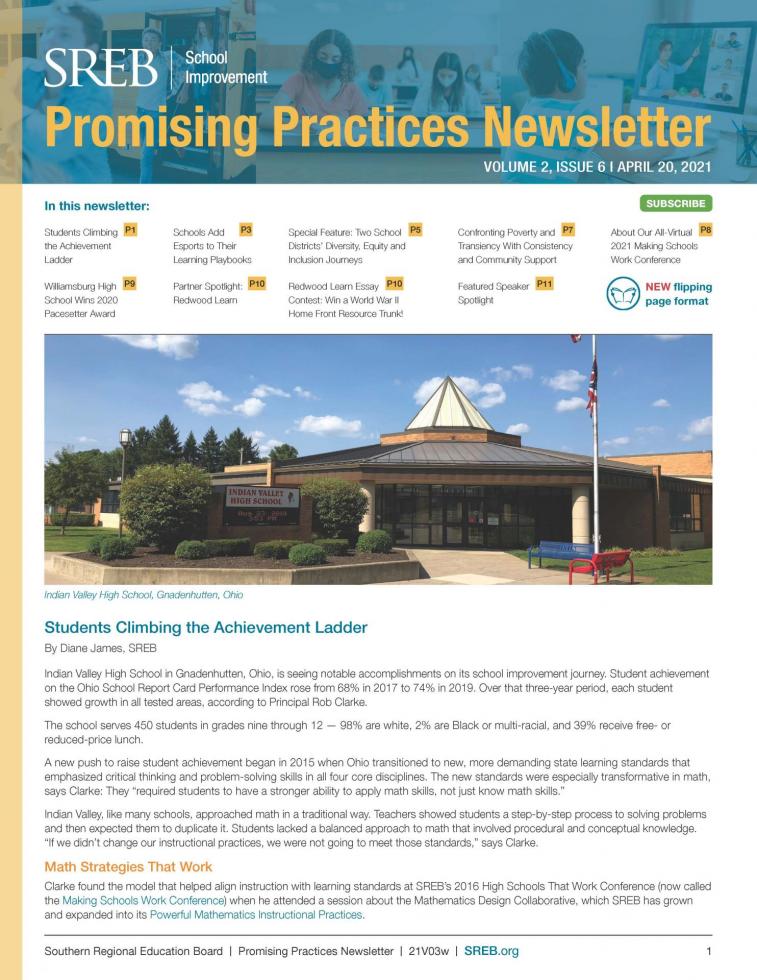 Getting students to master learning
standards is a journey, not a sprint. It takes quality teaching
and professional development, instruction aligned to standards
and so much more.
Getting students to master learning
standards is a journey, not a sprint. It takes quality teaching
and professional development, instruction aligned to standards
and so much more.
In this issue of our Promising Practices Newsletter, read how an Ohio high school implemented a three-year reform plan and saw student growth in all tested areas each year. The reforms were so successful that they trickled down to the middle and elementary grades.
This issue also includes a special feature on two districts’ diversity, equity and inclusion journeys by SREB’s Paula Egelson and Rebecca Purser.
Also featured:
- Schools Add Esports to Their Learning Playbooks
- About Our All-Virtual 2021 Making Schools Work Conference
- Williamsburg High School Wins 2020 Pacesetter Award
- Partner Spotlight: Redwood Learn
- Virtual Networking Reception
- Essay Contest: Win a World War II Home Front Resource Trunk
- Featured Speaker Spotlight
Start reading our NEW newsletter, now in a flipping-page format.
Preparing Students for Life After Graduation
News, stories and videos about teachers, counselors and school leaders
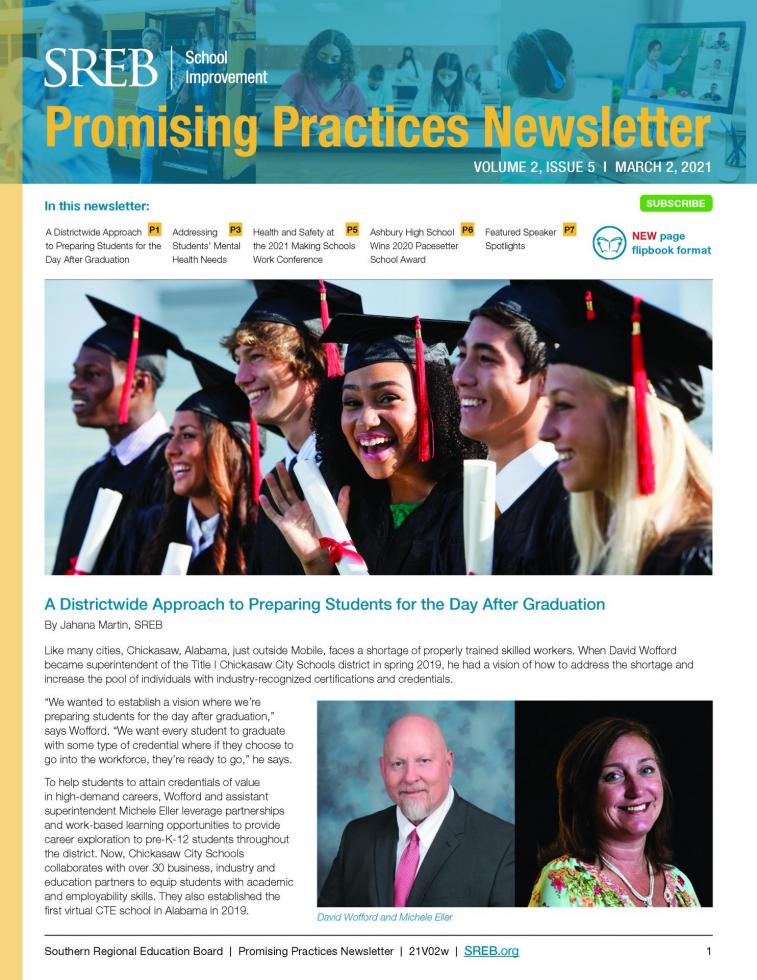 There’s no magic bullet or one-size-fits-all approach to preparing students to succeed after graduation. But most educators agree that students need to be well-rounded with a combination of core academic, technical and workplace skills.
There’s no magic bullet or one-size-fits-all approach to preparing students to succeed after graduation. But most educators agree that students need to be well-rounded with a combination of core academic, technical and workplace skills.
In this issue of our Promising Practices Newsletter, read how an Alabama school district is laser-focused on equipping students with academic knowledge, career exploration, hands-on experience, employability skills and credentials in high-demand fields.
Also featured:
- How a South Carolina high school addresses students’ mental health needs
- Ashbury High School Wins 2020 Pacesetter School Award
- Health and Safety at the 2021 Making Schools Work Conference
- Featured Speaker Spotlight: Mary Hemphill-Joseph
- Featured Speakers Promote Systemic, Sustainable Change
Start reading our new newsletter, now in flipping-page format.
School Culture: Pump It Up!
News, stories and videos about teachers, counselors and school leaders
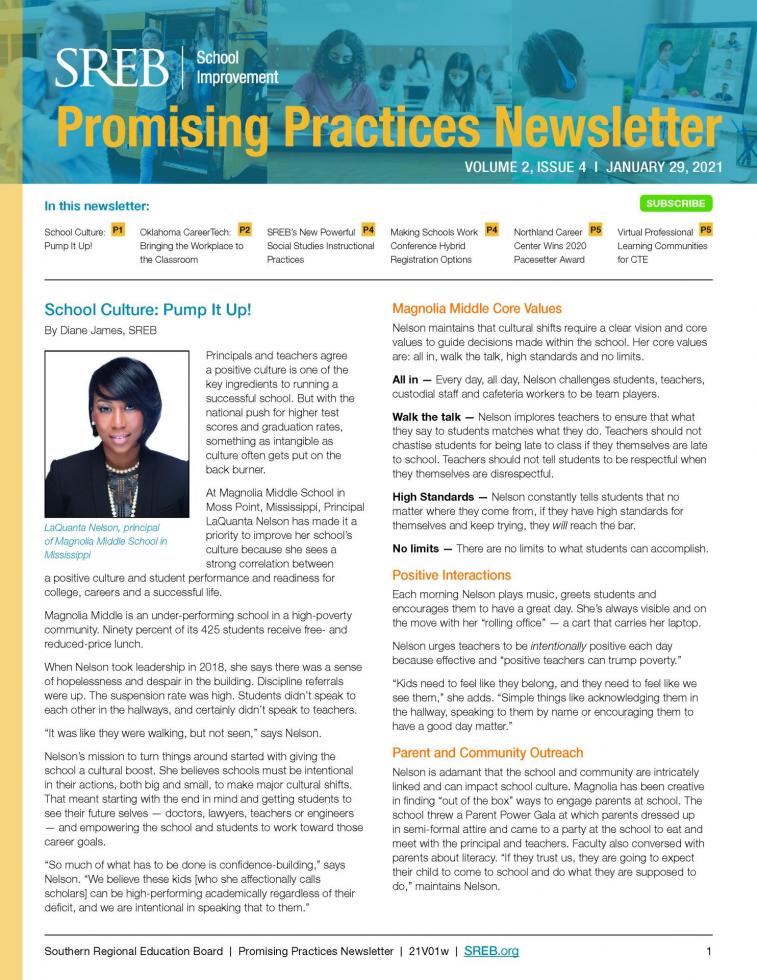 How students feel impacts the way
they learn. That’s why it’s so important to have a positive
school culture. In this issue of our Promising Practices
Newsletter, read how the staff at one Mississippi school were
intentional in their actions, big and small, to make major
cultural shifts that led to more engaged, higher-performing
students.
How students feel impacts the way
they learn. That’s why it’s so important to have a positive
school culture. In this issue of our Promising Practices
Newsletter, read how the staff at one Mississippi school were
intentional in their actions, big and small, to make major
cultural shifts that led to more engaged, higher-performing
students.
Also featured, find out how Oklahoma educators deliver work-based learning virtually.
Uniting Theater and Medicine in Education
News, stories and videos about teachers, counselors and school leaders
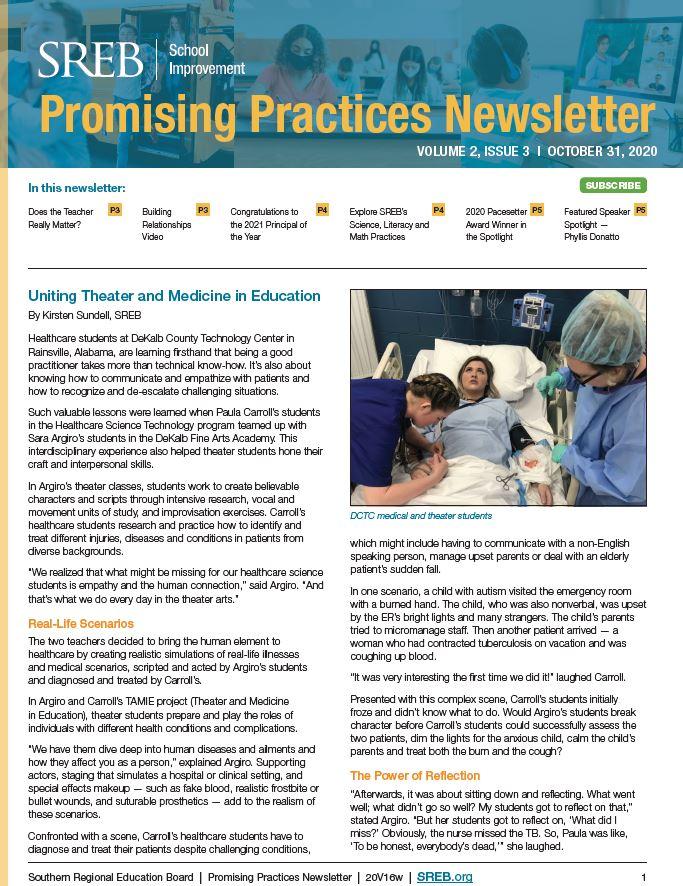 In this issue of our Promising
Practices Newsletter, read how theater students and healthcare
students at DeKalb County Technology Center in Rainsville,
Alabama, honed their craft by uniting in a project that involved
staging and solving real-world emergency medical scenarios.
In this issue of our Promising
Practices Newsletter, read how theater students and healthcare
students at DeKalb County Technology Center in Rainsville,
Alabama, honed their craft by uniting in a project that involved
staging and solving real-world emergency medical scenarios.
Also featured, find out why teachers matter and explore strategies for building positive relationships with students.
Teaching and Learning During a Health Crisis
News, stories and videos about teachers, counselors and school leaders
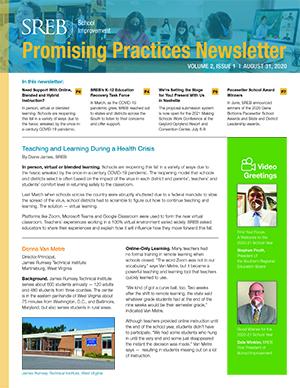 Teachers share their personal stories of the rewards and challenges of teaching in an online learning environment in this kick-off issue of the Promising Practices Newsletter. Read how SREB is helping schools and districts with online, blended and hybrid instruction. Also featured: Explore the work of SREB’s K-12 Education Recovery Task Force, Advanced Career, the Making Schools Work Conference and more.
Teachers share their personal stories of the rewards and challenges of teaching in an online learning environment in this kick-off issue of the Promising Practices Newsletter. Read how SREB is helping schools and districts with online, blended and hybrid instruction. Also featured: Explore the work of SREB’s K-12 Education Recovery Task Force, Advanced Career, the Making Schools Work Conference and more.
Closing the Achievement Gap
Spotlighting promising practices from the 2019 Making Schools Work Conference
How Strong CTE Teachers Drive School Improvement
Spotlighting promising practices from the 2019 Making Schools Work Conference
There’s Power in Struggle
Promising Practices from the 2019 College- and Career-Readiness Standards Networking Conference
Shaking Things Up With Coding in Core Classes
Promising Practices from the 2019 Making Schools Work Conference
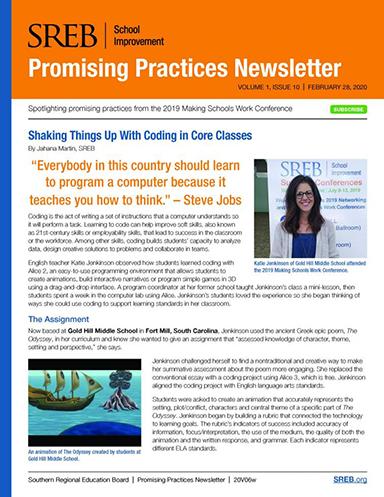 Coding is the act of writing a set
of instructions that a computer understands so it will perform a
task. Learning to code can help improve soft skills, also known
as 21st-century skills or employability skills, that lead to
success in the classroom or the workforce. Among other skills,
coding builds students’ capacity to analyze data, design
creative solutions to problems and collaborate in teams.
Coding is the act of writing a set
of instructions that a computer understands so it will perform a
task. Learning to code can help improve soft skills, also known
as 21st-century skills or employability skills, that lead to
success in the classroom or the workforce. Among other skills,
coding builds students’ capacity to analyze data, design
creative solutions to problems and collaborate in teams.
Taking School Improvement to the Next Level With a Needs Assessment
Promising Practices from the 2019 Making Schools Work Conference
Highlights From a Few of Our Featured Speakers
Promising Practices from the 2019 Making Schools Work Conference
The Opportunity Myth: How School Is Letting Students Down and How to Fix It
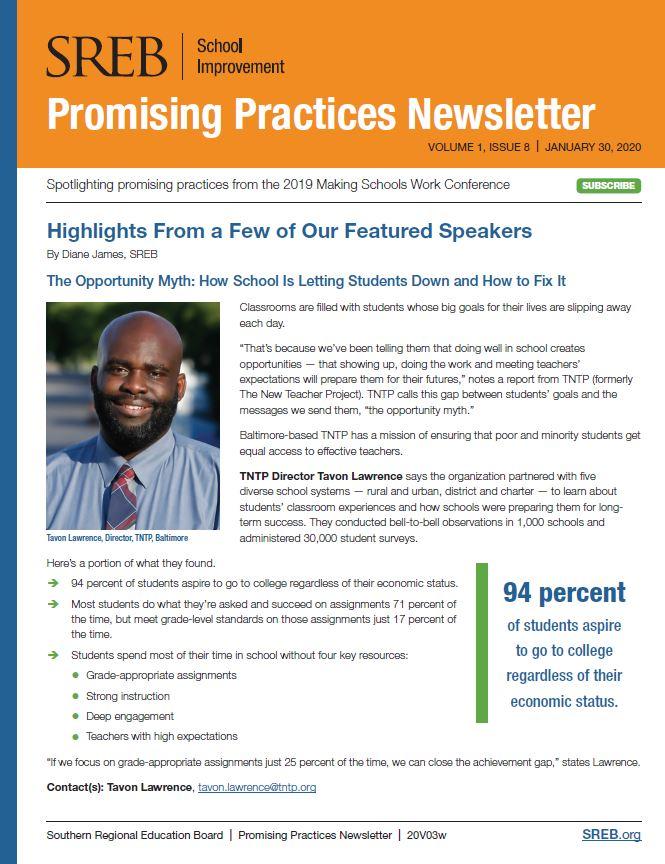 Classrooms are filled with
students whose big goals for their lives are slipping away each
day.
Classrooms are filled with
students whose big goals for their lives are slipping away each
day.
“That’s because we’ve been telling them that doing well in school creates opportunities — that showing up, doing the work and meeting teachers’ expectations will prepare them for their futures,” notes a report from TNTP (formerly The New Teacher Project). TNTP calls this gap between students’ goals and the messages we send them, “the opportunity myth.”


